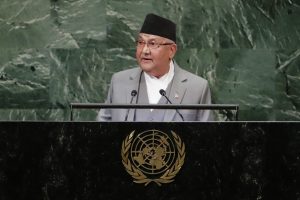The Nepal Communist Party (NCP) government in Kathmandu has secured a fresh lease on life with Prime Minister and NCP chief Khadga Prasad Sharma Oli and party co-chair Pushpa Kamal Dahal aka “Prachanda” agreeing to bury the hatchet. Under the terms of a settlement, Oli will continue as prime minister for the full term while Dahal will play an “expanded role” as the NCP’s executive chairman.
The possibility of the ruling NCP splitting has somewhat receded and calls for Oli’s resignation as prime minister have subsided. However, this could be just a temporary lull in the stormy and intrigue-ridden world of Nepali politics.
The NCP was formed in 2018 with the merger of the Oli-led Communist Party of Nepal (Unified Marxist-Leninist) and the Dahal-led Communist Party of Nepal (Maoist Center). Apparently, there was a tacit understanding that the prime minister’s post would alternate between Oli and Dahal; the two leaders would head the government for two-and-a-half years each. However, as the deadline for handing over the reins to Dahal approached, Oli denied that any post-sharing deal had been agreed upon.
In November last year, President Bidhya Devi Bhandari brokered a deal under which Oli was to remain prime minister for the full five-year term while Dahal would become the NCP’s executive chairman. In effect, this meant that Oli would run the government and Dahal would be in charge of party affairs. However, Oli refused to loosen his control over the party, insisting that he was the party’s “other executive chairman” and also its “senior chair.”
Preoccupied with holding on to power, Oli has neglected governance. The economic situation in Nepal which has been deteriorating for years has worsened with his inept handling of the COVID-19 pandemic. To divert public attention away from his own incompetence, he has stirred Nepali nationalist sentiment by adopting a confrontationist posture vis-à-vis India.
Oli has managed to rile almost every section of Nepal. While his “domestic failings” in governance brought angry youth out on the streets in protest, his autocratic style has brought former foes together. NCP leaders Madhav Kumar Nepal and Jhala Nath Khanal were once Oli’s allies against Dahal but since early this year, they have joined hands with Dahal to press for Oli’s resignation.
Although his opponents outnumbered his supporters in all NCP decision-making bodies, Oli could not be forced out of power. The wily leader used every trick in the book to hang on to power; he repeatedly avoided attending meetings to sort out differences with Dahal or postponed them, and even prorogued parliament to avoid a vote of no-confidence in his leadership. Oli seemed ready to split the party to be able to hold on to power. His obduracy resulted in a political impasse that lasted for months.
It was in this context that the NCP’s powerful Standing Committee appointed a six-member Task Force to recommend a way out of the impasse. In addition to clarifying Oli’s and Dahal’s roles, the panel has suggested a Cabinet reshuffle and a party general convention.
With Oli and Dahal, the two main actors in the conflict, agreeing to the Task Force recommendations, the crisis has been defused. But this could be a temporary truce.
After all, the latest compromise deal is the same as that brokered in November last year — and Oli backtracked on it. He has reneged on several pacts in the past. Dahal’s record in this regard is not blameless either; he withdrew support from Oli’s government in July 2016. The trust deficit between the two remains large and unaddressed. Both are ambitious. They will bide their time to strike again.
Importantly, the Task Force report offers other disgruntled leaders like Nepal and Khanal nothing. They will need to be appeased with powerful posts and appointments. Otherwise, they will revolt again.































